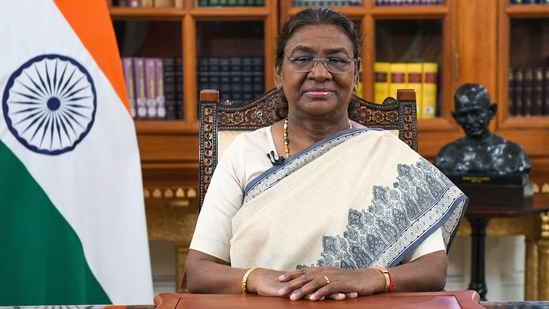New Delhi: Affirmative action should be strengthened as an instrument of inclusion, President Droupadi Murmu said on Wednesday, underlining that “all communities” had participated in India’s freedom struggle and adding that the successful conduct of elections “strengthens democratic forces around the world.”

Addressing the nation on the eve of the 78th Independence Day, President Murmu’s address celebrated recent successes of India, provided a wide view of the path ahead, and highlighted achievements that “set the stage for the next generation of economic reforms and economic growth that will catapult India among the developed nations.”
The speech emphasised that “affirmative action must be strengthened as an instrument of inclusion” and added that she “firmly” believed that in a vast country such as India, “tendencies that stoke discord based upon perceived social hierarchies have to be rejected.”
She pointed out to the Union government’s wide-ranging welfare measures targeted at Scheduled Castes, Scheduled Tribes and other marginalised sections such as Pradhan Mantri Samajik Utthan evam Rozgar Adharit Jankalyan or PM-SURAJ, that provides direct financial assistance to the marginalised communities.
“The Pradhan Mantri Janjati Adivasi Nyaya Maha Abhiyan or PM-JANMAN has taken the form of a mass campaign for critical interventions to improve socio-economic conditions of Particularly Vulnerable Tribal Groups, that is, PVTGs. The National Action for Mechanized Sanitation Ecosystem or the NAMASTE scheme will ensure that no sanitation workers will have to manually engage in the hazardous task of sewer and septic tank cleaning,” she said.
Murmu recalled India’s freedom struggle and while paying tribute to the titans of the freedom movement, she recognised that “it was a nationwide movement, in which all communities participated.”
The President spoke of how generations of Indians formed the links of this chain of history. “Alongside, there were great leaders like Sardar Patel, Netaji Subhas Chandra Bose and Babasaheb Ambedkar as well as Bhagat Singh, Chandrashekhar Azad and many others. It was a nationwide movement, in which all communities participated,” she said.
Pointing to the tribal leaders such as Tilka Manjhi, Birsa Munda, Laxman Naik and Phulo Murmu-Jhano Murmu, she said they were “among many more whose sacrifices are now being appreciated.”
The speech mentioned how the newly independent nation faced many obstacles but remained firm on the Constitutional ideals of “justice, equality, liberty and fraternity” and was now “on the mission to enable India to reclaim its rightful position on the global stage.”
She also highlighted the general election in April-June this year that saw 970 million people voting. Murmu reiterated that it was a “historic record, making it the largest electoral exercise humankind has ever witnessed” and went on to say, “When such a large number of people exercise their franchise, it is a resounding vote for the idea of democracy. India’s successful conduct of elections strengthens democratic forces around the world.”
The president focussed on justice, in particular, gender and climate justice and said, self-reliance in agriculture, boost in infrastructure, strategic planning and effective institutions in the expansion of roads, railways and ports, and promotion of a range of sectors set the stage for next generation of economic reforms.
“Farmers, our annadata, have ensured that agricultural production continues to beat expectations. With this, they have contributed immensely to making India self-reliant in agriculture and feed our people. Infrastructure has received a boost in recent years. Strategic planning and effective institutions have helped expand the network of roads and highways, railways as well as ports,” she said.
“Considering the great potential of futuristic technology, the government has vigorously promoted a range of sectors, such as semiconductors and artificial intelligence, while also creating an ideal ecosystem for startups which will propel their growth. It has made India an even more attractive investment destination. With greater transparency, the banking and financial sector has become much more efficient. All of these factors have set the stage for the next generation of economic reforms and economic growth that will catapult India among the developed nations,” Murmu said.
In her speech, the President mentioned how the country was “poised to become one of the top three economies soon” and credited “tireless hard work of farmers and workers, by the farsightedness of planners and wealth-creators, and by the visionary leadership” for this transformation.
“This rapid but equitable progress has given India a higher stature in global affairs,” Murmu said, “After the successful completion of its G20 presidency, India has consolidated its role as the voice of the Global South. India intends to use its influential position to expand the scope of world peace and prosperity,” she added.


